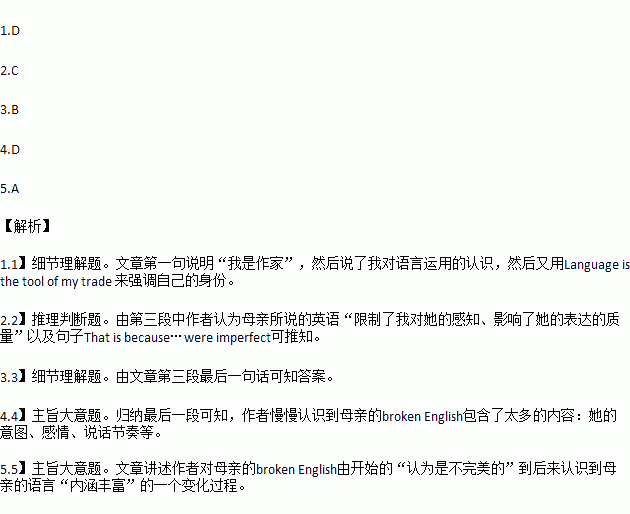题目内容
I am a writer. I spend a great deal of my time thinking about the power of language—the way it can evoke(唤起) an emotion, a visual image, a complex idea, or a simple truth. Language is the tool of my trade. And I use them all—all the Englishes I grew up with.
Born into a Chinese family that had recently arrived in California, I’ve been giving more thought to the kind of English my mother speaks. Like others, I have described it to people as “broken” English. But feel embarrassed to say that. It has always bothered me that I can think of no way to describe it other than “broken”, as if it were damaged and needed to be fixed, as if it lacked a certain wholeness. I’ve heard other terms used, “limited English,” for example. But they seem just as bad, as if everything is limited, including people’s perceptions(认识)of the limited English speaker.
I know this for a fact, because when I was growing up, my mother’s “limited” English limited my perception of her. I was ashamed of her English. I believed that her English reflected the quality of what she had to say. That is ,because she expressed them imperfectly her thoughts were imperfect. And I had plenty of evidence to support me: the fact that people in department stores, at banks, and at restaurants did not take her seriously, did not give her good service, pretended not to understand her, or even acted as if they did not hear her.
I started writing fiction in 1985. And for reasons I won’t get into today, I began to write stories using all the Englishes I grew up with: the English she used with me, which for lack of a better term might be described as “broken”, and what I imagine to be her translation of her Chinese, her internal(内在的) language, and for that I sought to preserve the essence, but neither an English nor a Chinese structure: I wanted to catch what language ability tests can never show; her intention, her feelings, the rhythms of her speech and the nature of her thoughts.
1.By saying “Language is the tool of my trade”, the author means that ______.
A. she uses English in foreign trade B. she is fascinated by languages
C. she works as a translator D. she is a writer by profession
2.The author used to think of her mother’s English as ______.
A. impolite B. amusing C. imperfect D. practical
3.Which of the following is TRUE according to Paragraph 3?
A. Americans do not understand broken English.
B. The author’s mother was not respected sometimes.
C. The author’ mother had positive influence on her.
D. Broken English always reflects imperfect thoughts.
4.The author gradually realizes her mother’s English is _____.
A. well structured B. in the old style
C. easy to translate D. rich in meaning
5.What is the passage mainly about?
A. The changes of the author’s attitude to her mother’s English.
B. The limitation of the author’s perception of her mother.
C. The author’s misunderstanding of “limited” English.
D. The author’s experiences of using broken English.
 名校课堂系列答案
名校课堂系列答案--______I can't see anybody here.( )
| A. | No doubt | B. | No wonder | C. | No need | D. | No good |

